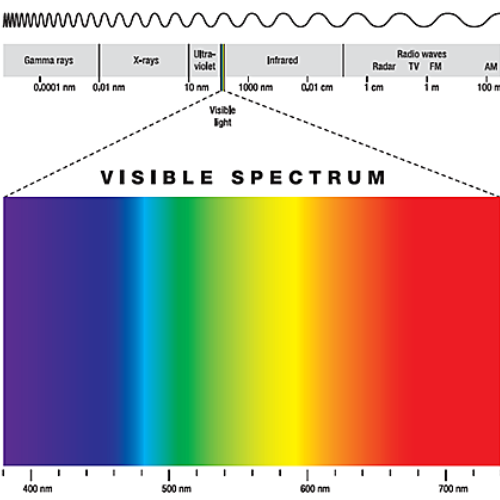
Blue Light Filter: What is it?
If you are reading this article, you probably spend a considerable amount of time in front of screens. So you've probably heard about blue light and its dangers. In order to protect yourself from it, several solutions exist. Some methods are very effective, such as the Gaming Glasses that we propose, while other solutions such as anti blue light filters may be more susceptible to criticism.
In this article, we will look at what blue light is, how a blue light blocking filter can be useful, and is it right for you?
What is Blue Light ?

Light is made up of particles that travel in waves of energy. The length and strength of these particles vary according to their position in the spectrum. The wavelengths of light are measured in nanometers (nm). Some are visible to the human eye, such as the colors red, orange, yellow, green, blue and violet. Others are invisible, such as infrared and ultraviolet.
Blue light is therefore a color in the visible light spectrum and lies in the 400-500 nm range.
As the diagram below shows, each wavelength range represents a different color.

Blue light in the 400-450 nm range is a very short wavelength and is particularly strong. This type of light can cause eye damage, such as macular degeneration, because of its ability to penetrate the retina of the eye.
Blue and green light from 450 to 550 nm has a direct effect on the brain's ability to produce melatonin, a hormone that is very important for sleep, health and general well-being.

Melatonin, also known as the sleep hormone, is produced by the pineal gland in our brain. Melatonin is responsible for regulating sleep and wakefulness.
After sunset, a signal is sent to the brain to start secreting melatonin, which causes us to fall asleep and eventually fall into a deep, restful sleep.
Exposure to artificial blue light at night completely disrupts this sleep preparation process. Blue light at night suppresses melatonin because of the signals it sends to your brain.
This causes the brain to think that it is the middle of the day, regardless of the actual time. Your brain then reacts by making you feel more awake and alert.
Exposure to blue light at night has an impact on our circadian rhythm, sleep and overall health.
The problem with modern devices, such as phones, LED bulbs, TVs and other forms of low-energy lighting, is that they emit a large amount of light in the blue spectrum, which can particularly disrupt the sleep hormone. There are several solutions to this problem.
Blue Light Blocking Filters

By now you are fully aware of the different sources of blue light and the various health risks associated with it. If you don't want to invest in a pair of blue light glasses, or if you want to use a protective filter in addition to your glasses, here's how.
There are a number of apps for phone and computer screens that "filter" blue light by shifting the color tone of the screen to warmer parts of the spectrum such as yellow, orange or red.
For starters, and depending on your operating system, you may have the option to enable Night Light (Windows 10) or Night Shift (macOS).
However, a recent study into the lack of effectiveness of Apple's Night Shift in producing melatonin may be reason enough to consider other options.
It is also possible to turn to the use of third-party software such as f.lux or Iris.
Although these applications reduce screen brightness and filter blue light for free, they lack effectiveness and need to be used in conjunction with blue light blocking glasses.
These filters can reduce contrast and distort the actual color of your screen, giving it a yellow, red or orange glow and making it harder to concentrate.
Most IT tools such as phones and computers usually have a basic application for this purpose.
Blue light blocking filters are usually designed to be used in the evening and at night, to allow the eyes to relax as they would naturally do during these hours.
As many people feel the need to see true colour and contrast when working or playing on their digital devices, blue light filters are not always the best protection option, especially for regular users.
Are Blue Light Blocking Filters enough?

Despite the fact that blue light filters and the few applications that exist can be a solution, these tools are not effective enough to prevent various eye problems and protect against overexposure to blue light. The distortion and color change caused by these filters can generate even more eye strain.
For example, LED light provides the backlighting for your devices and includes two major lights. White light as well as blue light; the various filters have no effect on these waves and should be used in conjunction with blue light blockingglasses.
Fluorescent lamps can emit light that is just as harmful, if not more so, than smartphones, computers and TV screens.
In summary, it can be concluded that blue light filtering applications cannot protect your eyes from all sources of blue light and are not sufficient to ensure your safety.
Blue Light Blocking Glasses

Blue light blocking glasses (sometimes called gaming glasses) are designed to filter out harmful screen light when you look at a computer, tablet or smartphone screen.
These lenses filter out blue light rays to prevent them from entering your eye and causing potential damage.
Some filter glasses look like normal glasses, with clear lenses, but intelligently filter out the majority of the most harmful wavelengths.
Let's take a look at some of the changes that blue light glasses can bring.
- Better sleep
Using a tablet or other type of screen before bedtime can delay this release, making it more difficult to fall asleep immediately.
Shortwave delays the release of melatonin, a sleep hormone that naturally starts to be released in your system a few hours before bedtime.
If you are unable to turn off your device an hour or two before bedtime, as recommended by sleep experts, using blue light goggles can help you sleep better.
- Less eye strain
Looking at a screen all day can make you feel stressed, or cause eye and muscle fatigue.
Blue light can make it difficult to focus on the screen, forcing your eyes to strain to concentrate. Blue light blocking glasses increase the contrast of the screen, making it easier to focus and reducing eye strain.
- Less headaches
Light, especially blue light, can trigger migraines and exacerbate headache pain. Blocking blue light with gaming glasses can reduce migraine attacks and ease headaches and their pain.
- Reducing the risk of eye diseases
Your cornea and lens are able to block harmful UV rays from reaching the retina. However, they cannot block blue light. Damage to the retina can increase the risk of macular degeneration (AMD), which is one of the leading causes of blindness.
Blue light can penetrate the retina and cause symptoms similar to those of macular degeneration, while increasing the risk of cataracts. Wearing protection can help prevent this.
At GMG Performance, we offer several pairs of blue light blocking glasses, all of which are effective, color-distortion free, and will keep you protected while enjoying your screens.



